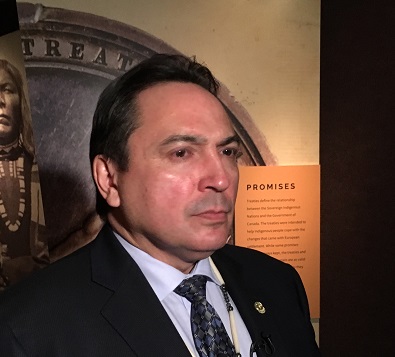Assembly of First Nations National Chief Perry Bellegarde said the announcement that there will be no appeal of the not-guilty verdict in the trial of Gerald Stanley is “another devastating blow to the family of Colten Boushie, and yet another indication to First Nations that Canada’s justice system is failing them — that it is a system that is not, in fact, providing justice.”
The announcement regarding the appeal was made in Regina Wednesday by Anthony Gerein, the Assistant Deputy Attorney General for Saskatchewan.
After extending condolences to Boushie’s family, Gerein explained why there would no further action in the case.
He stated that the Crown can only appeal if legal errors made over the course of the trial might have reasonably have made a material difference to the result.
“Me, lawyers who do the appeal work here in Saskatchewan, (and) experienced trial lawyers outside the appeal section, have applied the framework I have described and found no basis to appeal. Therefore, there will be no appeal,” said Gerein. “I know there is much sadness over the decision not to appeal, and that is unfortunate, but there can be no appeal because the law does not allow it.”
In his announcement, Gerein noted that this case was of particular public interest.
“We have here, in this case, a matter that is of interest of everyone in Saskatchewan and beyond Saskatchewan, and it is important that the justice system be as transparent as possible,” remarked Gerein.
Gerein also stated that any matters to be taken up in regards to jury selection should be taken up with elected officials.
“It must be remembered that the right to a representative jury is an entitlement held by the accused that promotes the fairness of his or her trial in appearance and in reality,” said Gerein. “It is not a mechanism for repairing the relationship between particular societal groups and our criminal justice system.”
Many people were upset with the selection of the jury in Stanley’s trial, claiming that it lacked Indigenous representation.
Bellegarde said Wednesday’s decision is indicative of a nationwide problem, even though the Civilian Review and Complaints Commission previously announced this week it is going to investigate the actions of RCMP officers in the aftermath of Boushie’s death.
“The CRCC review is important because a young man needlessly, senselessly lost his life,” Bellegarde said in a release. “But the review is only one step in a larger, broader process that affects all of us. I said when the verdict was first released that this case clearly spells out the need for governments at all levels to work with First Nations to develop a national strategy to address racism in Canada. The broader issues of racism and the failures of the overall justice system are precisely why this review must be one step in a process that becomes an actionable national strategy. First Nations will not stand for injustice and Canadians should not stand for it either.”
In a release, the Federation of Sovereign Indigenous Nations said it was “angered” at the Crown’s decision not to appeal the Stanley verdict.
FSIN Chief Bobby Cameron called for a “forensic accounting” of the verdict.
“This is a pivotal moment for Canada and Saskatchewan and the world to fix the systemic racism that has caused the over-representation of First Nations people in the justice system and to begin repairing the huge division that exists,” said Cameron. “We must have a loud voice at the table and collaborate collectively on Justice Reform that will be beneficial to all First Nations people and incorporate our Inherent and Treaty Rights. We continue our call for a Royal Commission into the Saskatchewan justice system. We are calling for a forensic accounting of this verdict.”
“Our support and prayers are with Colten’s family and Debbie today,” said FSIN Vice Chief Kim Jonathan in a statement. “The system is broken. There are real questions and concerns about how the RCMP managed the investigation from the beginning, as well as their conduct towards the Boushie family after his death. The jury selection was lacking Indigenous representation and the legal system needs to be reformed completely because there is no trust or faith in this system.”
“Civil unrest among non-First Nations is escalating as the RCMP continues to meet with the Rural Municipalities at town hall meetings,” said Jonathan. “The division between our communities is real and evident. The Canadian legal system has not changed much since 1885. 130 years ago in Battleford, Canada executed eight First Nations warriors in front of children from the Battleford Industrial School as a warning as to what would happen if you crossed the ‘White man.’ First Nations people are still being treated the same way, as second-class citizens in their own traditional lands.”
“It isn’t over,” said Boushie’s mother, Debbie Baptiste. “We are going to keep fighting for justice for my son.”
(PHOTO: AFN Chief Perry Bellegarde. Photo by Manfred Joehnck.)
